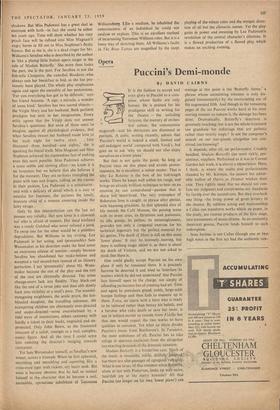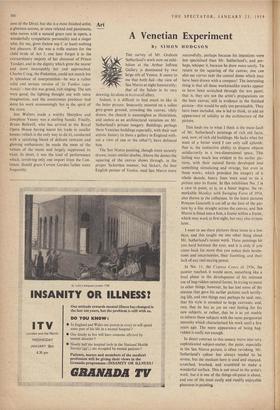Opera
Puccini's Demi-monde
By DAVID CAIRNS
But that is not quite the point. So long as Puccini stays on this plane and avoids preten- tiousness, he is excellent, a minor master. That is why La Boheme is the best of his full-length works. There he keeps well within his range, and brings an already brilliant technique to bear on an emotion he can comprehend—passion that is sharp but short-lived. The very transience of Bohemian love is caught, in phrase after phrase, with haunting precision. In that splendid slice of life outside the Cafe Momus, the passing scene with its street cries, its flirtations and jealousies, its idle gossip, its pathos, its meaninglessness, provides not only a congenial exercise for his technical ingenuity but the perfect material for his genius. The death of Mimi is still on this same 'lower plane.' It may be intensely moving, but there is nothing tragic about it, as there is about the death of Violetta, and we are not asked to think that there is.
One could gladly accept Puccini on his own plane if only he remained there. It is precisely because he deserted it and tried to Interfere/In matters which he did not understand' that Puccini lays himself open to the charge, not simply of offending puritanism but of creating bad art. Time and again he postulates grand, noble, large-scale human feelings and then fails to measure up to them. Tosca, an opera with a hero who is ready to be tortured rather than betray his beliefs, and a heroine who risks death to save her lover, is not in subject-matter so remote from Fidello but that one would expect the two works• to have qualities in common. Yet what an abyss divides Puccini's music from Beethoven's. In Turandot, the most ambitious of all, Puccini has to take refuge in spurious exoticism from the altogether too exacting demands of the dramatic situation.
Madam Butterfly is a borderline case. Much of the music is vivaci&S, subtle, skilfully joivred; but 'there are also passages of egregiou's vulgarity. What is one to say Of that moment when 13uiterfly, alone at last with Pinkerton, looks up with naive, heartfelt joy at the starry heavens? All that Puccini (no longer on his own 'lower plane') can
manage at this point is the 'Butterfly theme,' a phrase whose astonishing triteness is only dis- guised (momentarily) by the excruciating use of the augmented fifth. And though in the remaining pages of the act Puccini works hard in his most soaring manner to redeem it, the damage has been done. Dramatically, Butterfly's desertion is genuinely touching; but is not the whole treatment too grandiose for sufferings that are pathetic rather than strictly tragic? Is not the composer's assault on our tear-glands altogether too con- trived, too knowing?
It depends, after all, on performance. Crudely handled, Madam Butterfly can seem sickly, pre- tentious, repellent. Performed as it was at Covent Garden last week, it is almost a Masterpiece. Here, I think, is where the saints and perfectionists (headed by Mr. Kerman, the austere but admir- able author of Opera as Drama) weaken their case. They rightly insist that we should not con- fuse our judgment and compromise our standards by raving over the second-rate. But they overlook one thing—the living power of great artistry in the theatre. By sublime acting and musicianship a Callas can transform works which on paper, in the study, are routine products of the lyric stage, into monuments of music-drama. As an eminently theatrical genius, Puccini lends himself to such redemption.
Sena Jurinac is not Callas (though one or two high notes in the first act had the authentic raw-
ness of the Diva), but she is a most finished artist, a glorious actress, at once relaxed and passionate, who moves with a natural grace rare in opera, a wonderfully sympathetic personality and a singer who, for me, gives (below top C at least) nothing but pleasure. If she was a trifle mature for the child bride of Act 1, one later forgot it in the extraordinary majesty of her dismissal of Prince Yandori, and in the dignity which grew the nearer and more inescapably her end approached. Charles Craig, the Pinkerton, could not match her in splendour of interpretation--he was a rather solid and serious version of 'lo Yankee yoga- bondo'—but this was grand, rich singing, The sets were good, the lighting thought out with some imagination, and the anonymous producer had done his work unassumingly but in the spirit of '
the score. • Jess Walters made a worthy Sharpless and Josephine Veasey was a sterling Suzuki. Finally, Bryan Balkwill, who has arrived at the Royal Opera House having learnt his trade in smaller houses (which is the only way to do it), conducted with a satisfying blend of delicate restraint and glowing enthusiasm; he made the most of the virtues of the music and largely suppressed its vices. In short, it was the kind of performance which, involving only one import from the Con- tinent, should grace Covent Garden 'rather more frequently.











































 Previous page
Previous page